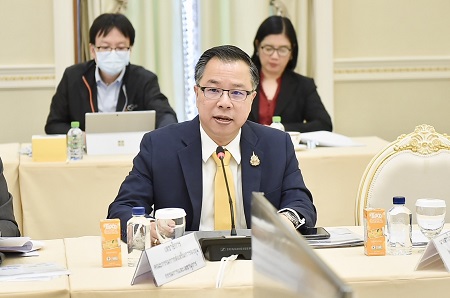
Thailand’s National Electric Vehicle Policy Committee (EV Board), chaired by Deputy Prime Minister Pichai Chunhavajira, today approved a temporary lowering of the excise tax rate for hybrid electric vehicles (HEV), on the condition the manufacturers make new investments in the technology in line with the latest technological standards and strict CO2 emission requirements. The new measure is expected to lead to 50 billion baht (ca. US$ 1.4 billion) in new investments.
To enjoy the reduced excise tax rates, a car manufacturer will be required to make actual new investments in Thailand of not less than 3 billion baht between 2024 and 2027, subject to BOI approval, Mr. Narit Therdsteerasukdi, Secretary General of the Thailand Board of Investment (BOI), who is also the secretary of the EV Board, told reporters at a press conference held after the EV Board meeting at Government House in Bangkok.
The reduced excise tax rate will be effective during the period 2028-2032, and will apply to HEV vehicles with no more than 10 seats.
“This new measure will support the transition of the country’s automotive industry towards vehicle electrification and the future development of the whole supply chain,” Mr. Narit Therdsteerasukdi said, “Thailand has the potential to become a production hub for all types of electrified cars, both complete cars and parts.”
The HEV production support measure will reduce the excise tax rate to a fixed level for the 2028 to 2032 period, replacing the earlier planed rate that had been set to rise 2% every 2 years. To qualify for the reduced tax rates, the HEV manufacturers will need to comply with strict carbon dioxide (CO2) emission requirements:
According to conditions specified by the BOI, the vehicles produced under the scheme will be required to use key parts produced in Thailand, and they will need to feature at least 4 of the 6 Advanced Driver-Assistance Systems, or ADAS.
The specified ADAS systems are: 1) Advanced Emergency Braking System (AEB); 2) Forward Vehicle Collision Warning Systems (FCW); 3) Lane Keeping Assistance Systems (LKAS); 4) Lane Departure Warning System (LDW); 5) Blind Spot Detection (BSD); and 6) Adaptive Cruise Control (ACC).
The EV Board’s decision will now be submitted to the Cabinet for consideration and final approval.
BEV Investments and Market Update
Mr. Narit also presented to the Board an update on the significant progress seen in Thailand's EV sector, as a result of the government's promotion measures. The combined investments made so far exceed 80 billion baht, encompassing the production of Battery Electric Vehicles (BEV), batteries, key parts, and charging stations.
The Excise Department's consumer-side incentives under the so-called EV3 and EV3.5 packages have played a pivotal role in attracting 24 brands to the market, leading to the production of over 118,000 vehicles across all categories. This growth is reflected in the registration statistics for the first half of 2024, which show a 19% year-on-year increase in BEV registrations to 37,679 units. Electric motorcycle registrations also saw a significant rise of 38% to 13,634 units. So far, 183,236 registered BEV vehicles of all types have been registered, showing the success of the government's strategic initiatives in fostering a sustainable electric vehicle ecosystem.
